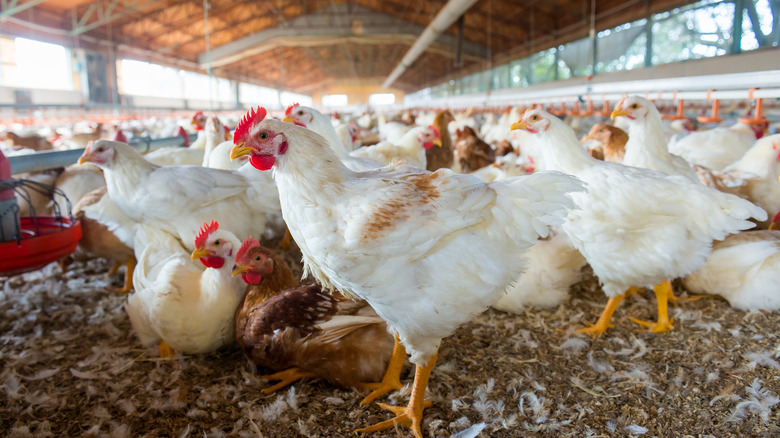The Unexpected Issue Holding Up A Massive Poultry Industry Merger
It was a match meant to create the third largest chicken processor in the United States. Agriculture conglomerate Cargill and specialty investment firm Continental Grain announced their intention to acquire Sanderson Farms for $4.5 billion in August of 2021, to form a new entity that could potentially produce 15% of chickens in the country, per The Wall Street Journal. Under the deal, per World-Grain, the venture would see Sanderson merged with Continental's Wayne Farms, and Wayne Farms' CEO Clint Rivers would be asked to head up the new entity.
But in a filing with the Securities and Exchange Commission made last December, Sanderson Farms revealed that the deal would not be completed during the first six months of this year. The reason — the Department of Justice was seen asking for more information on the merger. Now the Wall Street Journal says that the Justice Department is hoping to address what the publication has called "potential concessions" involving how both chicken farmers and workers at the processing plants are being paid. Without those concessions, The Journal says there is a chance the deal could fall through.
The trouble with the tournament system
According to The Wall Street Journal, one concession sought by the Justice Department has to do with putting an end to what's known in the chicken production industry as the "tournament system." The National Chicken Council, explains the system as one which involves contracting independent chicken farmers so they raise the fowl that is meant to be slaughtered. All the farmers are meant to start from the same level playing field. They are given the same type of chicks, feed, and access to the same type of veterinary care when needed. The farmers are also all given a base pay, but those who have the resources to build up their chicken farms are likely to have better facilities and grow better chickens, which means they are paid a higher rate.
In his analysis of the tournament system for the Johns Hopkins Center for a Livable Future, Robert Martin points out that the tournament pricing system "was designed by the major poultry processing companies to control producers by pitting farmers in a region against one another." Because of the tournament system, farmers lose the right to negotiate the price of the chickens they sell to producers. Martin adds: "There is no price or contract transparency, and integrators use the tournament system to turn producers against one another. It is common for producers performing in the lower half of tournament to lose their contracts after three or four consecutive low rankings."
The Sanderson deal has raised anti-trust concerns in Congress
The Sanderson Farm deal is being scrutinized at a time when the Biden administration is already accusing producers of raising the cost of meat for consumers while underpaying livestock growers and producers. It also comes as the Agriculture Department calls on the poultry industry to come up with ways to be more transparent about the way it is paying farmers, per The Wall Street Journal. The Department has even passed new rules calling for transparency about the type of feed the birds are given, and it has called for a clause requiring a guarantee that chicken processors have to buy a set number of birds a year.
The proposed merger has also raised eyebrows in Congress. In a letter to the Justice Department shared by Senator Elizabeth Warren earlier this year, Senators and House representatives point out that Tyson Foods, Pilgrim's Pride, Perdue, and Sanderson Farms hold 54% of the market share collectively, setting the conditions under which price fixing had become an issue. They further raised what they called "significant antitrust concerns in an industry already marked by price fixing, labor violations, and intense consolidation."


